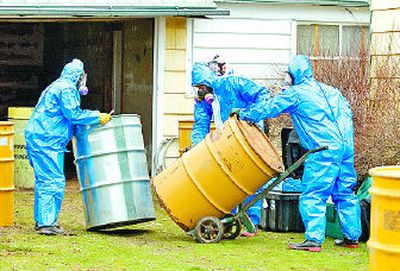Toxics found at house

Barrels of cyanide and other toxic chemicals were stored at the northwest Spokane home of a senior citizen – so many containers that her garage couldn’t hold them all.
U.S. Environmental Protection Agency and Washington Department of Ecology workers in hazardous waste suits cleaned up the toxic dump site Thursday and Friday.
Investigators found 50 containers in the detached garage at 5606 N. Loma Drive, said Ecology spokeswoman Jani Gilbert.
A few others were stored in the backyard behind the garage.
Most of the containers were 55-gallon drums containing cyanide and various corrosive and flammable materials. It appeared they had been stored there for several years.
“It’s a terrible thing to have things like that stored in a neighborhood. That’s why we have to get it out of there,” Gilbert said.
Crews “overpacked” the drums and other containers into larger containers for transport to an approved treatment and disposal facility, she said. The process prevents leaking or spilling on the way.
There was no evidence that any of the containers had leaked at the home, and environmental officials said an inspection showed the woman’s house was safe.
The homeowner, Genevieve Webb, said that her son stored the barrels and that she wasn’t concerned about them.
Gilbert said the source of the contaminants is under investigation, but other sources told The Spokesman-Review that the barrels were waste from a methamphetamine lab cleanup business.
Spokane County property records show that the home is owned by Genevieve Webb and Robert Webb.
Robert Webb retired from the Spokane Fire Department in 1990, fire officials said.
A 2000 article in The Spokesman-Review quotes Bob Webb speaking about cleaning up home meth labs. He is described as the president of cleanup company MGEC.
In the story, Bob Webb tells of the dangers of booby traps left in meth houses as well as the pollution caused by cooking meth.
Properly disposing of hazardous waste in the quantity found at the home could cost $10,000 to $30,000 or more, said Kip Silver, owner of Able Clean-Up Technologies in Spokane.
Silver’s company supplied the barrels the EPA and Ecology used to move the existing containers.
Silver said that while approved facilities are allowed to temporarily store hazardous materials, they must eventually be properly disposed of at specific locations. Some are as far away as Arkansas, Florida and New York.
Storing hazardous materials in a residential garage is certainly not going by the book, Silver said.
Neighbors were surprised by the scene that unfolded on the quiet street north of Rowan Avenue, near Alberta Street.
Next-door neighbor Stephanie McConahy said she had seen the barrels in the backyard but assumed they were empty.
“At least they’re taking care of it,” McConahy said of the environmental workers.